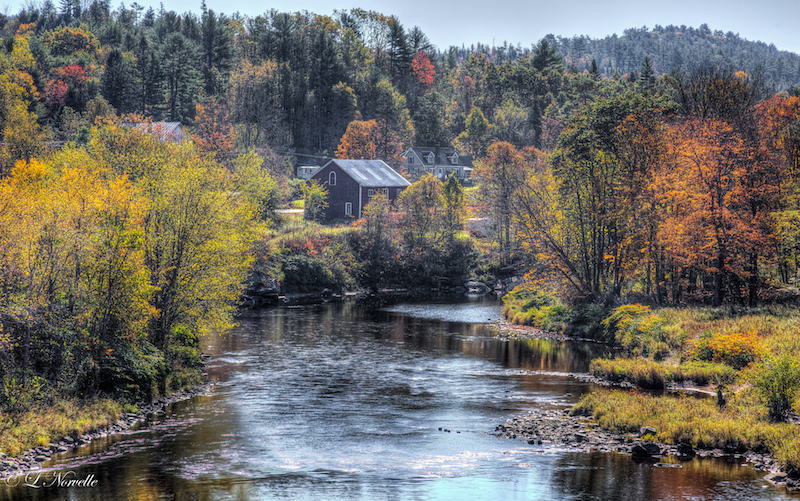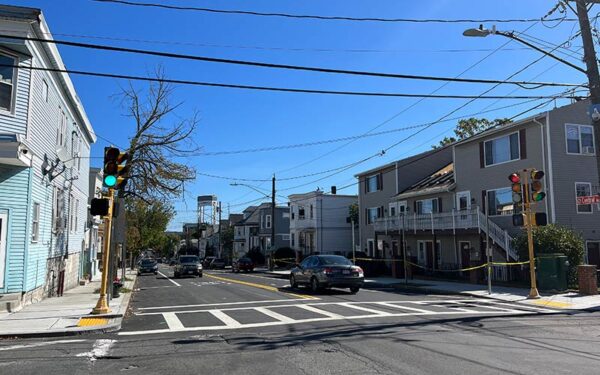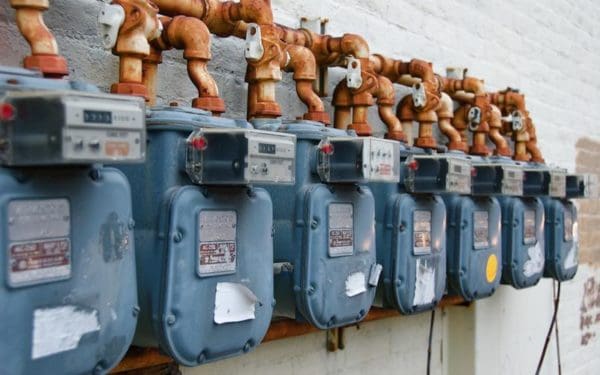
A fall landscape in Vermont. Photo: Vermont Upper Falls, © Linda Norvelle, Flickr
As fall cascades over New England, our states boast their true beauty. Gradating leaves shift hues from green to crimson and orange, and the crisp, chilled air sends us a signal to begin bundling up for colder weather. Some of us take to the outdoors to enjoy the natural wonders of the season, while others turn on the heat and simmer hot beverages to cozy up. And all of our neighborhoods, from the bustling cityscapes of Providence, Rhode Island to the ethereal forests of Stowe, Vermont, are a microcosm of this marvel.
Now, imagine a future where all of this, from the perfect view of our apartments and homes, is free from the public health and climate risks posed by dirty gas. Where our friends, families, and children can live safe lives in a thriving New England landscape.
We can help make that future a reality by transitioning to clean energy – here’s why.
Dirty Gas Is Just Another Fossil Fuel
Slithering under the ground, beneath our neighborhoods, are pipelines used to carry dirty gas into our homes and businesses. We use this gas as both a source of electricity and to heat our buildings. We even use gas for appliances, like our kitchen stoves.
But gas is an inherently dangerous fossil fuel. When burned, it releases polluting emissions into the air, emissions at the root of our climate crisis and emissions that lower air quality. Air pollution from gas is linked to asthma, lung cancer, and heart disease. And using gas appliances can raise toxic pollutant levels enough to irritate airways, increase susceptibility to allergens, and even cause learning deficits in our children. Gas doesn’t have to be burned for it to hurt our health. When it leaks out of pipelines, it contributes to smog, which triggers respiratory illnesses like asthma.
Dirty gas is also explosive. In September of 2018, the Massachusetts towns of Lawrence, North Andover, and Andover experienced multiple explosions from leaky pipelines – nearly 100 homes burned, killing an 18-year-old boy and injuring at least 25 others. But, in Massachusetts, this is only one example from many other gas-related explosions, like those in Fitchburg, Springfield, and Gloucester.
An incident like this should never happen again in any of our New England neighborhoods.
It Costs Us Our Health And Our Dollars
Dirty gas isn’t just bad for our health and safety, though. The costs of outdated infrastructure are being passed down to us in many ways, including our monthly bills. Old, outdated pipelines across New England are leaky. Leaky pipelines are what increase the risk for explosions. When gas seeps out of those pipelines, we’re paying for it in a stark increase to our bills. That means we’re fronting the cost of escaping gas that puts our health, and the safety of our communities, at risk. We’re also on the hook for the expensive cost of replacing those pipelines instead of transitioning towards cleaner and safer energy sources like solar or wind.
And Certain Neighborhoods Bear The Burden Of Dirty, Dangerous Gas
Not all our communities are affected similarly. People who can afford to switch to electric appliances and install clean energy infrastructure in their buildings are doing so and are projected to continue doing so. Those who can’t install new appliances or infrastructure (such as renters) or can’t afford to will be left paying for this outdated system – and paying a much larger bill spread across a dwindling customer base. The people who face the highest burden are communities of color and low socioeconomic status, who already bear the brunt of climate change and other environmental degradation.
Not to mention, dirty gas infrastructure (like pipelines and facilities) is overwhelmingly sited in these overburdened communities, increasing their exposure to poor air quality and risk of explosions.
Taking Back Our Future
Reclaiming a safe, thriving New England means transitioning to clean energy as urgently as possible. While we can start by electrifying if we have the means to (via heat pumps or electric stoves, for example), our real collective power comes from demanding that our governments move beyond gas and towards a clean energy future. Our local governments can transform how they regulate the gas and heating sector to stop expanding or installing pipelines. And our governments can amplify their support for clean energy: creating jobs within the industry, making it more accessible and easier for people to electrify, and supporting the expansion of clean energy infrastructure instead.
As we bask in the wonderous shift from summer to that classic New England fall, we can remember what’s at stake. We know the value of our communities, our neighborhoods, and the people that live in them. It’s time to take back our hope for a thriving future by transitioning away from dirty, dangerous gas and towards safer and healthier clean energy.


